Top 15 American Olympic MomentsAh, the Olympic Games. The one time every other year where the world becomes obsessed with sports they never usually care about. But really. We're so lucky to have live in a country that's so steeped in Olympic history. And now that we're just about halfway through the games of the XXXI Olympiad in Rio de Janeiro, Brazil, let's take a look at just how awesome our country is at doing the Olympic thing. This is a two-part list series, where I'm taking a look at the best American Olympic moments, followed by the best Olympic moments from around the rest of the world. (SG- Summer Games; WG- Winter Games. Just in case you were curious). Honorable Mentions: Dara Torres still has game; wins silver at age 41 (2008 SG, Beijing)
Greg Louganis shows the board who's boss (1988 SG, Seoul) Already a decorated Olympic medalist, with a silver in 1976 and two golds at the 1984 Games in Los Angeles, Greg Louganis was poised to repeat his success on both the 3m springboard and the 10m platform at the 1988 games in Seoul. On a preliminary attempt on the springboard, however, Louganis, suffered a concussion when his head connected with the diving board on the way into the pool. Instead of bowing out, Louganis, like a champ, continued to compete, and ended up earning the highest single score of the qualifying round with his second dive. He won the gold medal in that same event by a margin of 25 points, using the same dive on which he nearly split his head open. The Fierce Five- U.S. Women Conquer in London (2012 SG, London) 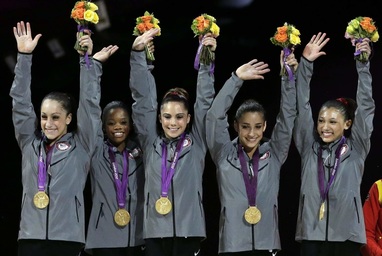 Wieber, Douglas, Maroney, Raisman and Ross became the second U.S. team to win the team all-around in London. Wieber, Douglas, Maroney, Raisman and Ross became the second U.S. team to win the team all-around in London. After modest showings in 2004 and 2008, with Carly Patterson and Nastia Liukin winning individual all-around golds, the United States women’s gymnastics team showed up to the games sporting a group of remarkable young women known as the “Fierce Five,” poised to become only the second American team ever to win the team all-around event. It featured McKayla Maroney, who placed second on the individual vault event (inspiring the ever-popular “McKayla is not impressed” meme), Aly Raisman, whose inspiring floor routine earned her an individual gold, and one Gabby Douglas, who became the third consecutive American to win the individual all-around gold. With performances by these three women, as well as the likes of Jordan Wieber and Kyla Ross, the team showed the unstoppable prowess of American women in the gymnastics arena. Rulon Gardner defeats Aleksandr Karelin (2000 SG, Sydney) 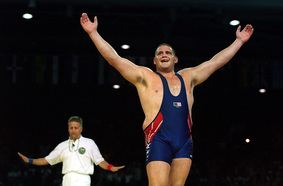 Before Gardner defeated him, Aleksandr Karelin had not been defeated in 13 years. Before Gardner defeated him, Aleksandr Karelin had not been defeated in 13 years. Much like another American upset that I’ll get to later on the list, Rulon Gardner came into the Sydney Olympics as a massive underdog against the rest of the field. He had never been an NCAA Champion or a World Medalist of any kind. Miraculously, he made it all the way to the gold-medal match for 130kg-class Greco-Roman wrestling, something an American had never medaled in before. His opponent, Russian Aleksandr Karelin, had not lost a match in 13 years of international competition, and had not surrendered a point in nearly a decade. Still, in a shocking upset, Gardner was able to defeat the mighty Russian by a score of 1-0, winning the gold medal. The Top 15: 15. U.S. Women's National Team is golden in extra time (2004 SG, Athens)  The first of many for the legendary Abby Wambach. The first of many for the legendary Abby Wambach. There’s nothing better than winning a game in overtime. Well, how about winning a gold medal on a goal in overtime? That’s exactly what happened at the 2004 Summer Games in Athens, when the United States took on Brazil in the final of the women’s football tournament. With the score tied at 1 goal each at the end of regulation, the two football superpowers took the game into extra time. In the 122nd minute, and only 8 minutes remaining until impending penalty kicks, American Abby Wambach (one of the most legendary American female footballers ever, who was only 24 at the time) knocked in a header off a corner kick from Kristine Lilly, giving the Americans a 2-1 advantage. The Americans would close out the Brazilians to win their second gold medal in 8 years. 14. The "Dream Team" dominates the rest of the world (1992 SG, Barcelona) Originally, the Olympic games were meant to bring together the best amateurs in the world of sports; that is, professionals were not to be found in the sports the Olympics have to offer. By the 1992 Summer Games in Barcelona, Spain, that had all changed. For the first time, the NBA’s best were sent to Barcelona to compete for a gold medal- and that meant, for the first time, the NBA’s best Americans were going to compete against the rest of the world. Let’s take a second to list off the number of Hall of Famers on this team. David Robinson. Patrick Ewing. Larry Bird. Scottie Pippen. Michael Jordan. Clyde Drexler. Karl Malone. John Stockton. Chris Mullin. Charles Barkley. Magic Johnson. With the exception of Christian Laettner of Duke, the only collegiate player on the team, that’s EVERYONE. Everyone else on the team is a Hall of Famer. Experts call it the greatest basketball team ever assembled. Then there’s the Olympic results. The Americans never scored fewer than 100 points in a game, and defeated all of their opponents by 30 points or more. They finished with a dominant 117-85 win over Croatia in the Gold Medal game. 13. Eric Heiden wins five speed skating gold medals (1980 WG, Lake Placid) Located outside of the Lake Placid Ice Arena is the Olympic Skating Rink. Not your traditional speed skating arena, the oval is located on a frozen-over section of the track at Lake Placid High School. It’s also outside, where the bitter winds and cold can freeze skaters in their tracks. The conditions did not affect Eric Heiden, however, who tore up the track during the 1980 Games, in the shadow of what was going on inside the hockey rink. In each of the men’s individual events, Heiden not only won a gold medal, but set an Olympic record in each one. That’s five gold medals, one in the 500m, 1000m, 1500m, 5000m, and 10000m. Heiden also set a new World Record on the 10000m, with a time of 14:28.13. In spite of the cold, Heiden was red hot for the Americans. 12. Dan Jansen wins gold in the name of his sister (1994 WG, Lillehammer) On the day of the 500m speed skating event in 1988, Dan Jansen was notified that his sister Jean was dying of Leukemia. A few hours later, he was notified of her death. He went on to compete in the 500m race later that day, but ended up falling in the first turn. He also began the 1000m race under record-breaking speed, but ended up falling once again. Upon returning to the 1992 Winter Games in Albertville, France, Jansen again Jansen was the favorite to win both the 500 and 1000m races. He finished 4th and 26th, respectively. Finally, two years later in Lillehammer, Norway, Jansen pulled through, winning the gold in the 1000m. Jansen dedicated the win to his sister, and was chosen by his fellow Olympians to hoist the U.S. flag at the closing ceremonies, in recognition of his perseverance through six years of athletic despair and overcoming a painful emotional loss. 11. Michael Johnson smashes two world records (1996 SG, Atlanta) 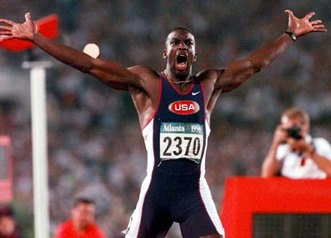 Johnson set world records in both the 200 and 400 meters. Johnson set world records in both the 200 and 400 meters. The 200m and 400m races are two very different things. The 200m is far more sprint-based, while the 400m requires a steady balance of stamina control and knowing when to push at just the right time. While many sprinters compete in all kinds of events of varying lengths, no athlete had ever won both events at the same Olympics. At the Centennial Olympic Games in Atlanta, Georgia in 1996, Johnson did just that. First was the 400m, which Johnson easily won with a world record time of 43.49 seconds. A few days later, Johnson did it again, smashing the existing 200m world record by four tenths of a second. This record would stand until a runner named Usain Bolt would break it in 2009 (Johnson’s 400m record was broken at the 2016 games in Rio de Janeiro by Wayde van Niekerk of South Africa). During the races, Johnson sported a pair of custom gold Nike sneakers, earning him the nickname “the man with the golden shoes.” 10. Mary Lou Retton becomes first American to win all-around gold (1984 SG, Los Angeles) Before 1984, no American had ever won the all-around gold medal in artistic gymnastics. At the 1984 Summer Games in Los Angeles, California, 16-year old Mary Lou Retton became the first. With two events remaining in the competition, and trailing the event favorite, Romanian Ecaterina Szabo by .15 points, Retton scored perfect 10s on both the vault and floor exercises, with the latter coming in dramatic fashion, considering she had undergone an operation to repair an injured knee five weeks prior to the games. Retton earned the victory over Szabo by .05 points, earning “America’s Sweetheart” a gold medal- the first gymnast outside of Eastern Europe to ever do so. 9. Ali lights the flame (1996 SG, Atlanta) During the 1996 Opening Ceremony, there was a large amount of speculation as to who was going to light the torch. The 1996 Games were incredibly important; not just for the United States as host nation, but for the Olympics as a whole, as the 1996 Games celebrated the 100-year anniversary of the first Modern Olympic games. After the participating nations made their way around into Centennial Olympic Stadium, the Olympic Torch made its way into the stadium, first being passed to hometown Atlantan Evander Holyfield, whom many thought would be the one to light the torch. However, swimmer Janet Evens’ lap around the stadium finished with a pass to one of the greatest sportsmen to ever live- Muhammad Ali. Ali, shaking due to the effects of Parkinson’s disease, lit a mechanical torch, which traveled along a wire to a cauldron atop the stadium. The fact that the torch lighter was kept a secret was dramatic enough, but to have it be Muhammad Ali (who received a replacement gold medal for his success at the 1960 Rome Olympics) is even more emotional. The emotion is clear in Ali’s eyes, making his lighting of the torch one of the most poignant and dramatic images of the 1996 Summer Games. 8. Carl Lewis matches Jesse Owens (1984 SG, Los Angeles) 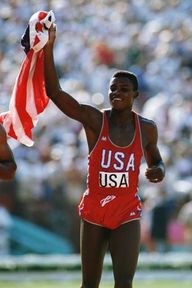 Lewis after winning his fourth gold medal in Los Angeles. Lewis after winning his fourth gold medal in Los Angeles. Carl Lewis’s track and field record is not to be messed with. He is a four-time Olympian, competing in the 1984, 1988, 1992 and 1996 Summer Games, winning at least one gold medal at each (and a total of 10 medals overall). At his first Olympics in 1984 in Los Angeles, Lewis was entered in four events, having a strong possibility of winning each one, thereby emulating the legendary Jesse Owens and winning four individual gold medals at a single Olympics. First was the 100m dash, which he won handily by running a 9.99, .2 seconds faster than the second place finisher. Second was the long jump. Lewis’s first jump was 8.52m (28 feet), and would easily be enough to win the event. Though he was encouraged to keep jumping in an attempt to break Bob Beamon’s 29’ 2 ¼” jump, Lewis held off, fearing that pushing himself too hard might wear him out from winning his final two events (he did end up winning the long jump event). In the 200m, Lewis set a new Olympic record, winning in a time of 19.8 seconds. Finally, he anchored the 4x100m relay team, where the United States set a new world record of 37.83 seconds, with Lewis racing the best 100m of his life. With his four golds, Lewis solidified himself as one of the fastest men alive, and equaled one of America’s Olympic legends. 7. The Black Power salute (1968 SG, Mexico City) 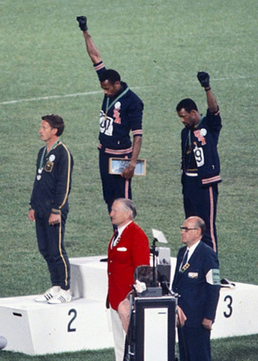 Smith (center) and Carlos (right) raise gloved fists into the air. Smith (center) and Carlos (right) raise gloved fists into the air. With a time of 19.83 seconds, Tommie Smith set a new world record in the 200m final, winning a gold medal. John Carlos, who finished with a time of 20.1 seconds, ended up with a bronze medal. But the times and standings were not important at the Games in Mexico City in 1968. In a daring act of political protest, Smith and Carlos, standing on the medal podium without shoes (instead, wearing black socks), bowed their heads, and raised a black-gloved fist into the air during the playing of the Star-Spangled Banner, in solidarity with the Black Freedom Movement in the United States. Both Smith and Carlos were booed from the podium, expelled by the IOC from the Olympics, and heavily criticized at home (with both men and their families receiving death threats). While the move was highly controversial, however, Smith and Carlos exhibited immense bravery by demonstrating an imbalance of both human rights and racial justice, doing so on the world’s largest stage for sport. In 2008, despite the backlash from the gesture, Smith and Carlos were given the Arthur Ashe Award for Courage at the ESPY Awards. For a brief moment on the world stage, two men dared to look into the eyes of the powerful, and, as solid as a clenched fist, declare their pride in being not only American, but an American athlete of color. A truly defining Olympic moment if ever there was one. 6. Florence Griffith-Joyner becomes the world's fastest woman (1988 SG, Seoul) Flo-Jo was an unknown in 1988. Now, we all know her as the woman whose records seemingly cannot be touched. Before the U.S. Olympic Trials in 1988, Joyner had not exactly been the most prominent competitor, with her personal best in the 100m being a 10.89 into the wind. At the trials, however, that all changed. Joyner broke the world record for the 100m by nearly a quarter of a second. She backed up the win with three equally strong races at the 1988 Summer Games in Seoul, South Korea, setting an Olympic record at 10.62 seconds. In the 200m, Flo-Jo was even more dominant. The 200m world record, set originally by East German Marita Koch in 1979, was 21.71 seconds; the previous Olympic record, set by American Valerie Brisco-Hooks at the Los Angeles Games in 1984, was 21.81 seconds. In the quarterfinals alone, Joyner shattered the Olympic record, posting a 21.76. In the semifinals, she shattered the world record by nearly .2 seconds, with a 21.56. Finally, in the finals, Joyner took home a gold medal, breaking her own world record in the process by running a 21.34. In less than three days, both the Olympic and world records had been completely shattered. Florence Griffith-Joyner had run the 100m and 200m faster than any woman in history. The best part? No one has come close to touching Flo-Jo’s marks in almost 30 years. 5. Kerri Strug's gold-winning vault on a broken ankle (1996 SG, Atlanta) The scene is the Centennial Olympic Games in Atlanta, Georgia. The event is the women’s gymnastics team all-around, an event that had been dominated by Russian and Romanian teams for decades- and never won by the Americans. The “Magnificent Seven” as they were called, were in a tight spot, trailing the Russian team by a very slim margin heading into the final day of team competition. After all but one rotation, however, things were beginning to look the Americans’ way, as they held a commanding .897-point lead over the Russians with one event remaining: the Russians were on the floor, and the Americans were on the vault. Theoretically, the Russians could clinch the gold, but only if the Americans were to suffer a colossal collapse. Four of the Americans stuck their landings, but did not do so cleanly. To make matters worse, Dominique Morceau fell on both vault attempts. Strug was the last to vault for the Americans. On her first attempt she under-rotated, severely damaging her left ankle (she was awarded a 9.1 for the vault itself). Since the final Russian to perform on the floor (Roza Galieva) would go after Kerri’s second vault, Strug needed to land her second vault cleanly in order to secure the gold medal. After limping back to the start line, Strug miraculously stuck her landing on what appeared to be one foot. She immediately collapsed to the mat in pain, but she had done what her team and country needed her to do- secure the first team all-around gold medal for the United States. The image of coach Bela Karolyi carrying Strug to the podium is one of the most touching images in American Olympic history. 4. Mark Spitz wins seven gold medals (1972 SG, Munich) 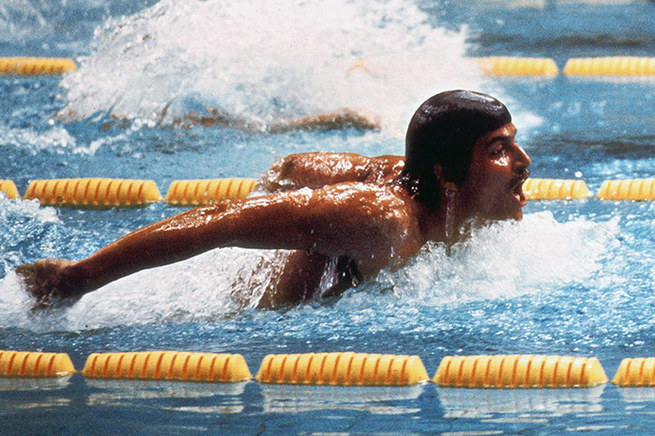 Spitz in the midst of his 200m butterfly race. Spitz in the midst of his 200m butterfly race. The 1972 Summer Games in Munich, West Germany are steeped in controversy and sadness. What gets lost among all the politics of the games, and is often forgotten, is one of the single greatest performances in the history of the modern Olympics. In 1968, Spitz brashly predicted that he would win six gold medals, one more than the current record of 5 at the time, held by American shooter Willis A. Lee at the 1920 Summer Olympics in Antwerp, Belgium. Spitz only won two team events in Mexico City, along with winning a silver and a bronze. Poised to better his results in 1972, Spitz entered seven different events in Munich. In one of the most impressive swimming exposition of all time, Spitz won all seven of the events he entered- a record seven gold medals at one Olympics. To make it even sweeter, Spitz set world records in all of those events. In true Olympian fashion, Spitz dominated his competition, even though his races were very close to one another time-wise. On one day, he set a world record in the 100m butterfly, then, an hour later helped his team set a world record in the 4x200m freestyle relay. Spitz’s record would remain for 36 years. What is unfortunate is that Spitz’s success gets lost in the shadow of the tragedies outside of the Olympics, which, as a Jewish-American athlete, prevented him from staying in Munich for the duration of the games, as he left shortly after completing his tremendous run of success. 3. Michael Phelps wins eight gold medals (2008 SG, Beijing) Just like Spitz before him, Michael Phelps was a standout athlete, already having competed in two Olympics prior, winning eight medals in Athens in 2004, six of them gold. Also like Spitz before him, Phelps was poised to overcome greatness before him, and best his predecessor’s record of seven gold medals at a single Olympics, by winning eight. The road did not come easy, though. First was the 400m individual medley, which Phelps won in a world-record time of 3:29.24. Second was the 4x100m freestyle relay, in which the Americans were underdogs to France. Phelps set an American record for his 100m leg, but it was teammate Jason Lezak, the anchor of the team, who made up half a body length on French swimmer Alain Bernard, to win Phelps his second gold by .08 seconds, and set a world record in the process. He then won the 200m freestyle in world record time. The next day, he pulled a Mark Spitz, competing in two finals in one day: first the 200m butterfly (1:52.03, world record), and, less than an hour later (sound familiar?), swam the first leg of the 4x200m freestyle relay (which his team won in a world record time of 6:58.56- breaking the previous record by four seconds). His sixth medal came in the 200m individual medley, which was a world record time of 1:54.23. The seventh medal may have been the most difficult: the 100m butterfly. Phelps defeated Serbian Milorad Cavic by .01 seconds to set a new Olympic record (leaving Spitz’s record of WR’s equaled but not broken), and obtain a seventh gold medal. The following night, Phelps swam for Olympic history, with team USA winning the 4x100m medley relay, in (once again) world record time. While his Olympic swimming career may now be over, Michael Phelps’ indelible image remains: 25 Olympic medals, 23 of them gold, 8 of them during one week in Beijing in 2008. 2. Jesse Owens embarrasses Hitler in Berlin (1936 SG, Berlin) When Berlin was selected to host the 1936 Summer Olympics, the year was 1931. Adolf Hitler and the Nazi Party did not rise to power until 1933. When it did, however, the IOC was hesitant to keep the games in Berlin. A prominent Nazi newspaper was steadfast in its belief that Jews and Blacks would not be allowed to compete in the games, although that position was retracted due to an impending boycott from a number of nations. Still, though, when the games opened in 1936, it was evident that Hitler saw the Olympics as a perfect opportunity to promote both his government and his ideas of racial supremacy. There was one athlete, however, who continued to poke a hole in his side- a black man named Jesse Owens. Owens singlehandedly crushed Hitler’s myth of Aryan supremacy, winning four gold medals: the 100m, 200m (where he set a new Olympic record), the long jump, and participating in the 4x100m relay, in which the US set a new world record for the event. Germany may have received the most medals at the 1936 games, but for one athlete to embarrass a man who wanted to distinguish the power of his country singlehandedly is quite the achievement in itself. There is speculation whether or not Hitler shook Owens’ hand after the fact. But Jesse Owens is proof that, black or white, German or American, the best pure sportsman emerges victorious. 1. The "Miracle on Ice," United States defeats Soviet Union. (1980 WG, Lake Placid) 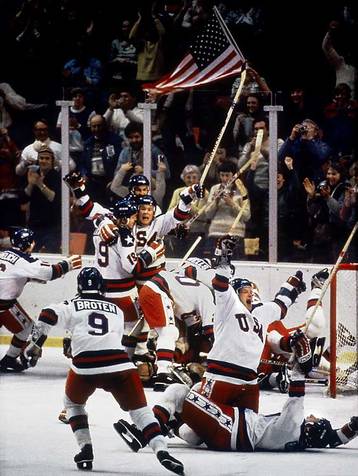 Do you believe in miracles? Do you believe in miracles? It all began with this notion that “nobody beats the Soviet Union in hockey.” And, for the most part, that was true. The Soviets had won the gold medal in hockey at every Olympics since 1960. Many of their players had been training and playing together on the same squad for 15 years, and some even longer than that. The USA hockey team that entered the games in Lake Placid, New York, was made up of college students and amateurs, none of whom really knew each other all that well. In short, no one was giving them a chance. Before the games, the Americans barely managed to stay afloat in international play, tying a terrible Norway team in Oslo, and getting routed by the Soviets at Madison Square Garden. And yet, Herb Brooks’ squad never seemed to give up. In the Olympics, the United States did not lose a game in pool play. Their first game of the medal round, however, was against the Soviet Union, who also went undefeated in pool play. The Soviets, as heavy favorites, were obviously shocked when Mark Johnson’s goal beat the horn at the end of the first period, tying the game at 2 apiece. At the end of two periods, it was 3-2, Soviets. In the third period, the Americans got some much needed defense from goaltender Jim Craig, who stopped 36 of 39 shots in the game. Mark Johnson’s second goal of the game tied the score at three, and Mike Eruzione’s goal with 10 minutes to play gave the Americans a shocking 4-3 lead. The Soviets, clearly being outhustled by the United States, gave it all they had, but Jim Craig stood on his head to take away every scoring chance. It remains one of the biggest upsets in all of sports: USA 4, USSR 3. What most people forget, though, is that the Americans still needed one more victory to win the gold medal. They would get it- a 4-2 victory over Finland- and go on to receive the gold medal in front of their home crowd. Go and listen to Al Michaels’ call of the last ten minutes of the game, from the Eruzione goal onward. Perfection. There aren’t many sporting events that one may call special- hell, you typically don’t see the United States being the underdogs in any kind of sporting event anymore. But for a nation longing for some kind of victory against the backdrop of the looming Cold War, the victory over the Soviet Union was proof that sometimes, miracles do happen. Did we miss any out? What was your favorite American Olympic moment? Leave a comment down below.
0 Comments
Leave a Reply. |
Details
AuthorI enjoy making lists, countdowns, and making sense of the world that I see around me. CategoriesArchives
December 2020
|
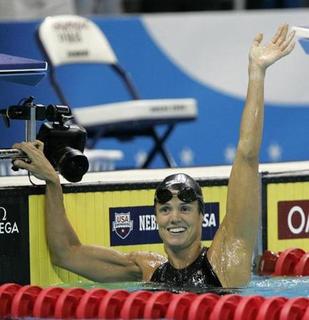
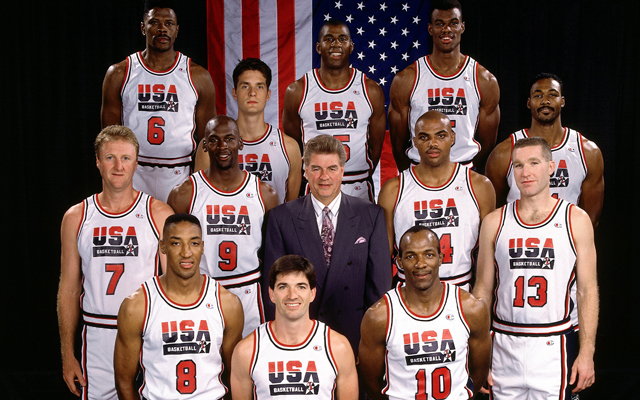
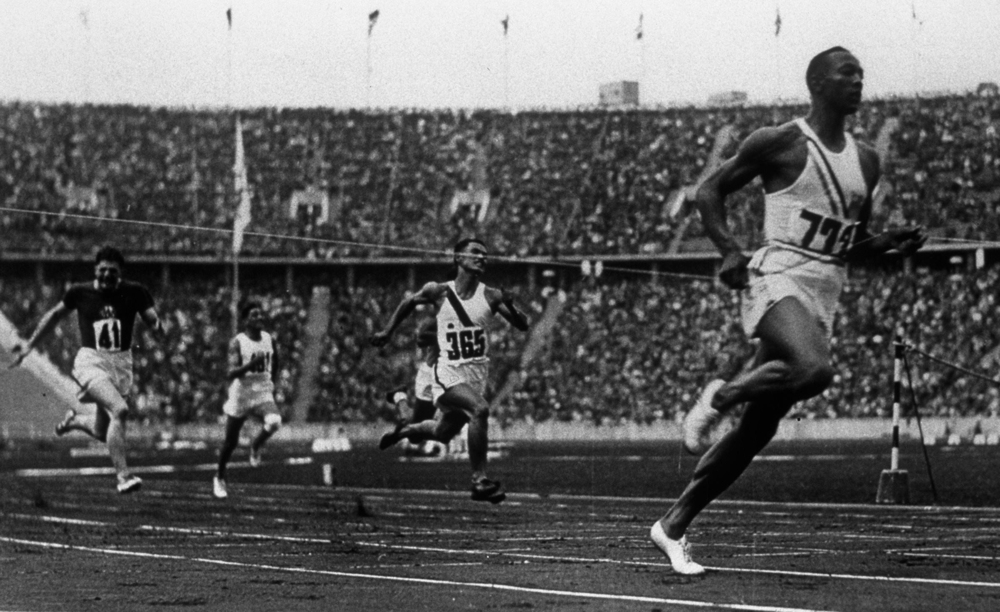
 RSS Feed
RSS Feed
